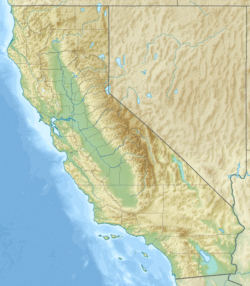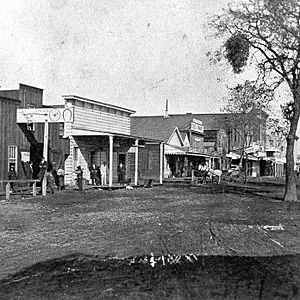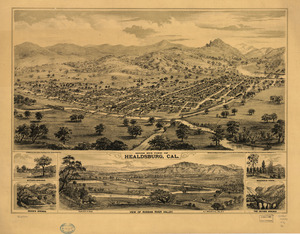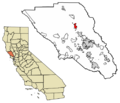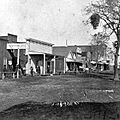Healdsburg, California facts for kids
Quick facts for kids
City of Healdsburg
|
|
|---|---|
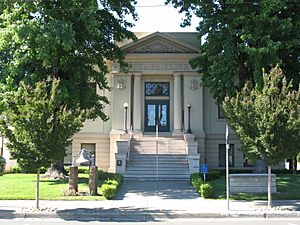
Healdsburg Carnegie Library, which now houses the Healdsburg Museum
|
|
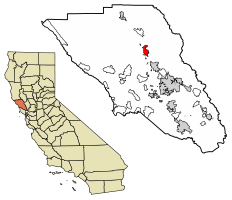
Location of Healdsburg in Sonoma County, California
|
|
| Country | |
| State | |
| County | Sonoma |
| Founded | 1857 |
| Incorporated | February 20, 1867 |
| Founded by | Harmon Heald |
| Government | |
| • Type | Council–manager |
| Area | |
| • Total | 4.42 sq mi (11.45 km2) |
| • Land | 4.42 sq mi (11.45 km2) |
| • Water | 0.00 sq mi (0.00 km2) 0.15% |
| Elevation | 105 ft (32 m) |
| Population
(2020)
|
|
| • Total | 11,340 |
| • Estimate
(2023)
|
11,137 |
| • Density | 2,680.1/sq mi (1,034.79/km2) |
| Demonym(s) | Healdsburgians |
| Time zone | UTC-8 (Pacific) |
| • Summer (DST) | UTC-7 (PDT) |
| ZIP code |
95448
|
| Area code | 707 |
| FIPS code | 06-33056 |
| GNIS feature IDs | 277530, 2410726 |
Healdsburg is a city in Sonoma County, California, United States. It's known for its central plaza from the 1800s. In 2020, about 11,340 people lived there.
Contents
Discovering Healdsburg's Past
Long ago, the Pomo people lived in this area. They built villages along the Russian River. Later, in the mid-1800s, people from Europe and other parts of America started to settle here.
In 1857, a businessman named Harmon Heald bought some land. This is when the city officially began. Ten years later, in 1867, Healdsburg became an official town. The San Francisco and North Pacific Railroad reached Healdsburg in 1872, helping the town grow. For many years, from the 1890s to the 1940s, farming was a big part of life here. People grew fruits in orchards and vegetables on truck farms.
Did you know that the seasoning lemon pepper was first developed for sale in Healdsburg in 1967?
Exploring Healdsburg's Geography
Healdsburg covers about 4.46 square miles (11.55 square kilometers). Most of this area is land, with a very small amount of water. The city is located right on the Russian River. This spot has been used as a river crossing since the 1850s. Today, the Healdsburg Memorial Bridge stands there.
Foss Creek flows through the city from north to south. It eventually joins Dry Creek near the main highway, U.S. 101.
Healdsburg's Climate and Weather
Healdsburg has cool, wet winters and warm, dry summers. In January, the average high temperature is about 58°F (14°C), and the low is around 38°F (3°C). In July, it gets warmer, with average highs near 89°F (32°C) and lows around 53°F (12°C).
The city gets about 42 inches (107 cm) of rain each year. It rains on about 73 days annually. Snow is very rare here. The highest temperature ever recorded was 117°F (47°C) in September 2022. The lowest was 14°F (-10°C) in December 1990.
| Climate data for Healdsburg, California (1991–2020 normals, extremes 1897–present) | |||||||||||||
|---|---|---|---|---|---|---|---|---|---|---|---|---|---|
| Month | Jan | Feb | Mar | Apr | May | Jun | Jul | Aug | Sep | Oct | Nov | Dec | Year |
| Record high °F (°C) | 85 (29) |
88 (31) |
95 (35) |
102 (39) |
108 (42) |
116 (47) |
116 (47) |
114 (46) |
117 (47) |
108 (42) |
98 (37) |
83 (28) |
117 (47) |
| Mean maximum °F (°C) | 68.3 (20.2) |
73.0 (22.8) |
80.0 (26.7) |
89.1 (31.7) |
95.3 (35.2) |
101.7 (38.7) |
103.3 (39.6) |
103.2 (39.6) |
99.8 (37.7) |
91.6 (33.1) |
77.9 (25.5) |
68.4 (20.2) |
106.4 (41.3) |
| Mean daily maximum °F (°C) | 57.7 (14.3) |
61.5 (16.4) |
66.0 (18.9) |
72.1 (22.3) |
79.0 (26.1) |
85.8 (29.9) |
88.7 (31.5) |
88.3 (31.3) |
84.6 (29.2) |
76.9 (24.9) |
64.9 (18.3) |
57.3 (14.1) |
73.6 (23.1) |
| Daily mean °F (°C) | 48.5 (9.2) |
51.3 (10.7) |
54.4 (12.4) |
58.6 (14.8) |
64.3 (17.9) |
69.7 (20.9) |
71.5 (21.9) |
71.0 (21.7) |
68.5 (20.3) |
62.7 (17.1) |
53.8 (12.1) |
48.0 (8.9) |
60.2 (15.7) |
| Mean daily minimum °F (°C) | 39.3 (4.1) |
41.0 (5.0) |
42.7 (5.9) |
45.1 (7.3) |
49.5 (9.7) |
53.7 (12.1) |
54.3 (12.4) |
53.7 (12.1) |
52.3 (11.3) |
48.5 (9.2) |
42.7 (5.9) |
38.7 (3.7) |
46.8 (8.2) |
| Mean minimum °F (°C) | 29.6 (−1.3) |
31.7 (−0.2) |
33.9 (1.1) |
36.8 (2.7) |
42.6 (5.9) |
45.6 (7.6) |
48.6 (9.2) |
47.4 (8.6) |
44.3 (6.8) |
39.2 (4.0) |
32.3 (0.2) |
29.0 (−1.7) |
27.0 (−2.8) |
| Record low °F (°C) | 18 (−8) |
21 (−6) |
27 (−3) |
24 (−4) |
30 (−1) |
32 (0) |
31 (−1) |
33 (1) |
30 (−1) |
26 (−3) |
25 (−4) |
14 (−10) |
14 (−10) |
| Average precipitation inches (mm) | 8.00 (203) |
8.33 (212) |
6.35 (161) |
2.87 (73) |
1.60 (41) |
0.35 (8.9) |
0.00 (0.00) |
0.04 (1.0) |
0.10 (2.5) |
2.20 (56) |
4.46 (113) |
8.51 (216) |
42.81 (1,087) |
| Average precipitation days (≥ 0.01 in) | 14.0 | 12.2 | 11.6 | 7.5 | 4.7 | 1.0 | 0.1 | 0.2 | 0.9 | 3.5 | 8.1 | 13.3 | 77.1 |
| Source 1: NOAA | |||||||||||||
| Source 2: NOAA | |||||||||||||
Protecting Healdsburg's Environment
The Russian River is a very important part of Healdsburg's natural environment. The city also has two special nature areas called open space reserves. These are managed by a group called LandPaths.
The Healdsburg Ridge Open Space Preserve has 150 acres (61 hectares) of wetlands, oak woodlands, and grasslands. The Fitch Mountain Open Space Preserve has 173 acres (70 hectares). Healdsburg residents also help the environment by recycling their waste. The city tries to keep the environment quiet by setting rules about noise levels.
Healdsburg's Population and People
Healdsburg has grown quite a bit over the years. In 1860, there were only 334 people. By 2020, the population had grown to 11,340.
| Historical population | |||
|---|---|---|---|
| Census | Pop. | %± | |
| 1860 | 334 | — | |
| 1870 | 959 | 187.1% | |
| 1880 | 1,133 | 18.1% | |
| 1890 | 1,485 | 31.1% | |
| 1900 | 1,869 | 25.9% | |
| 1910 | 2,011 | 7.6% | |
| 1920 | 2,412 | 19.9% | |
| 1930 | 2,296 | −4.8% | |
| 1940 | 2,507 | 9.2% | |
| 1950 | 3,258 | 30.0% | |
| 1960 | 4,816 | 47.8% | |
| 1970 | 5,438 | 12.9% | |
| 1980 | 7,217 | 32.7% | |
| 1990 | 9,469 | 31.2% | |
| 2000 | 10,722 | 13.2% | |
| 2010 | 11,254 | 5.0% | |
| 2020 | 11,340 | 0.8% | |
| 2023 (est.) | 11,137 | −1.0% | |
| U.S. Decennial Census | |||
<graph>{"version":2,"width":515,"height":237,"data":[{"name":"table","values":[{"x":1860,"y":334},{"x":1870,"y":959},{"x":1880,"y":1133},{"x":1890,"y":1485},{"x":1900,"y":1896},{"x":1910,"y":2011},{"x":1920,"y":2412},{"x":1930,"y":2296},{"x":1940,"y":2507},{"x":1950,"y":3258},{"x":1960,"y":4816},{"x":1970,"y":5438},{"x":1980,"y":7217},{"x":1990,"y":9469},{"x":2000,"y":10722},{"x":2010,"y":11254}]}],"scales":[{"name":"x","type":"ordinal","range":"width","zero":false,"domain":{"data":"table","field":"x"}},{"name":"y","type":"linear","range":"height","nice":true,"domain":{"data":"table","field":"y"}}],"axes":[{"type":"x","scale":"x"},{"type":"y","scale":"y"}],"marks":[{"type":"rect","from":{"data":"table"},"properties":{"enter":{"x":{"scale":"x","field":"x"},"y":{"scale":"y","field":"y"},"y2":{"scale":"y","value":0},"fill":{"value":"steelblue"},"width":{"scale":"x","band":"true","offset":-1}}}}]}</graph>
| Racial and ethnic composition | 2000 | 2010 | 2020 |
|---|---|---|---|
| White (non-Hispanic) | 67.76% | 62.54% | 58.51% |
| Hispanic or Latino (of any race) | 28.82% | 33.94% | 34.61% |
| Two or more races (non-Hispanic) | 1.48% | 1.32% | 3.83% |
| Asian (non-Hispanic) | 0.62% | 1.0% | 1.45% |
| Other (non-Hispanic) | 0.08% | 0.15% | 0.53% |
| Native American (non-Hispanic) | 0.88% | 0.59% | 0.52% |
| Black or African American (non-Hispanic) | 0.33% | 0.38% | 0.45% |
| Pacific Islander (non-Hispanic) | 0.03% | 0.09% | 0.11% |
Population Details from 2010
In 2010, Healdsburg had a population of 11,254 people. Most people lived in homes, with a small number in special facilities. The population was mostly White, with a significant Hispanic or Latino community, and smaller groups of other races.
About 30% of households had children under 18. Many households were married couples. The average household had about 2.5 people. The median age in Healdsburg was 40.8 years old. This means half the people were younger than 40.8, and half were older.
Arts and Culture in Healdsburg
Healdsburg has a rich history and culture. The Healdsburg Carnegie Library is a historic building that now houses the Healdsburg Museum. Both the library and the Healdsburg Memorial Bridge are listed on the National Register of Historic Places. This means they are important historical sites.
In 1983, a survey found over 300 historic places in the city. Healdsburg has also named eleven of its own historic landmarks. There are also two special historic districts: the Johnson Street Historic District and the Matheson Historic District.
Healdsburg in Movies
Healdsburg has been a filming location for a couple of movies:
- The 1943 film Happy Land was filmed in and around the city.
- The 1996 horror film Scream also used Healdsburg as a setting.
City Services and Transportation
Emergency Services for Safety
The Healdsburg Police Department keeps the city safe. The Healdsburg Fire Department handles fires and other emergencies. For medical emergencies, Bell's Ambulance provides services. They have been helping the community since 1956.
Getting Around Healdsburg
You can get around Healdsburg using Sonoma County Transit buses. There are also plans for a future train stop for the Sonoma–Marin Area Rail Transit line. The Amtrak Thruway 7 bus also connects Healdsburg to other cities like Martinez and Arcata.
Education in Healdsburg
Schools in Healdsburg are part of the Healdsburg Unified School District.
Famous People from Healdsburg
Many interesting people have lived in or were born in Healdsburg. Here are a few:
Actors
- Raymond Burr: actor
- Patti McCarty: actress
- Ariana Richards: actress and painter
Artists and Architects
- Charles Bello: architect and artist
- Richard Diebenkorn: artist
- Tony Evans: ceramic artist
- Wade Hoefer: painter
- Rosinda Holmes: printmaker and painter
- Rexford Holmes: printmaker
- Lar Landa: Italian figurative artist
- Jean Mooney: painter
- Gail Packer: printmaker
- John Carl Warnecke: architect
- Robert Weiss: ceramic artist
Businesspeople
- Kristen Barnhisel, winemaker
- Paul Erdman: business and financial writer
- Jess Stonestreet Jackson Jr.: wine entrepreneur
Historical Figures
- Henry D. Fitch: early resident
- Roderick N. Matheson: early resident
Musicians and Bands
- Ron Elliott : oldies singer and guitarist for The Beau Brummels.
- Heidi Newfield: country singer
- Jack Sonni: former guitarist of Dire Straits
Politicians
- Mike McGuire: politician
- Jim Wood: politician
Sports Figures
- Jim Cullom: professional football player
- Ralph Rose: track and field athlete, Olympic gold medalist
- Hazel Hotchkiss Wightman: tennis player, Wimbledon and Olympic champion
Writers
- Mary Ellen Bamford: author
- Helen Beardsley: author
- John Udell: diarist of the American frontier
Other Notable People
- L Peter Deutsch: creator of Ghostscript
- Thomas C. Reed: former Secretary of the Air Force
- Effie Robinson: social worker
Images for kids
See also
 In Spanish: Healdsburg para niños
In Spanish: Healdsburg para niños


